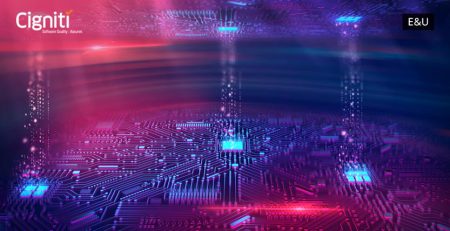The Revolutionary Impact of Digital Twin in the Energy Sector
Many of the world-changing solutions in use today were ridiculed at the time of their invention. Edison was mocked for creating the light bulb, which was called an absolute ‘ignis fatuus’ at that time and unworthy of the attention from a scientific or practical man. There was also a time when people were believed to be afflicted from ‘computerphobia’, characterized by a fear of touching and damaging the computer, causing an aversion from reading or talking about it. Today, there are over 48% households globally with a private computer and more than 4 billion internet users across the world.
We are progressing toward a smarter future, more sophisticated than the present, more digital than ever. We cannot predict the timeframe in which a truly digital world will be completely built, but it is not too far away either. Smartphones are already ubiquitous, while smart homes are paving their way into our lives through smart speakers, smart security systems, smart lights, smart thermostats, smart doorbells, and smart leak, smoke & CO emission detectors. The employment of plethora of IoT devices for executing the ‘smartness’ will result in generation of tons and tons of data. This demands an effective way of managing and mining such volumes of data for extraction of valuable information. Effectuation of this smart future requires a reliable, perpetual, scalable, and efficient source of energy. The digitally transforming scenario began 4th Industrial revolution, which is further driving Energy 4.0 for the E&U sector.
When we say that everything is getting digitized, we are essentially talking about a digital way to interact, use, or control a physical entity. However, the extent of such usage is limited in terms of features and scope. With the existing systems, it is not feasible to monitor, analyze, control, or alter every aspect of a physical element. Such a system relies heavily on manual intervention and decision-making. The advent and rising adoption of digital twin technology is a much-needed outcome and solution of this drawback. Digital twin method is set to revolutionize the energy sector while alleviating the factors of high costs, storage concerns, and smart grid management.
The troubled twin you knew about
There are numerous components and a vast infrastructure involved in the transmission and distribution of energy over extensive landscapes. In the U.S. alone, the current electric grid consists of over 9200 units with a capacity of generating more than 1 million Megawatts of energy. The interconnectivity between these thousands of units requires high-end maintenance. Manually handling such an enormous amount of maintenance is tiring and creates challenges of power outages, inefficient operations, and sometimes, equipment failure due to inadequate management.
The digital twin you didn’t know, but should
Named as one of the Gartner’s Top 10 Strategic Technology Trends for 2019, Digital Twin is a cloud-based simulated model of a physical process, object, or service. Despite being in existence for more than a decade, the technology has just started gaining momentum, thanks to the advancements in the fields of big data, IoT, machine learning, AR, and AI. The digital twin market is projected for an estimated 38.2% CAGR, reaching a total worth of $26.07 Billion by 2025.
Digital twin technology in energy industry are enabling the development as well as maintenance of smart grids that are equipped with hi-tech sensors and machine learning models for enhanced performance and monitoring. Smart grid meters enable energy service providers to take informed, strategic decisions and mitigate vulnerabilities and risk factors by disseminating up-to-the-minute data. Bringing the mix of cyber-physical systems, cloud computing and intelligent industrial solutions, digital twin technology is becoming the backbone for smart grid implementation, renewable energy management, better integration and efficient transmission.
The deployment of various IoT devices in the smart grid empower the digital twin to collect data on its physical twin’s performance through smart sensors. These sensors gather information on factors such as temperature and moisture to alert the operators in case of any discrepancy. The integrated machine learning models of digital twin feed upon this data and offer valuable insights on any potential risk and operational glitch. Digital twin adoption for energy sector is making it possible to establish a balance between supply and demand by enabling proactive dealing of operational issues, thus, facilitating faster power restoration and outage reversal.
The digital game is on, so is Energy 4.0
As per IDC, there will be a 30% visible improvement in the cycle times of critical processes for the companies investing in digital twin technology.
Major industry players of the energy & and utilities sector are leveraging the capabilities of cloud-enabled digital twin technology. The Department of Energy will be investing $ 8 Million to fortify the U.S. energy infrastructure against cyber threats while coping with the rising energy demands. British Petroleum uses the digital twin technology to map oil field production. Tesla builds a digital twin for every manufactured VIN to deploy regular updates to its customers’ cars. General Electric tracks more than 70% of its jet engines across the world with the help of millions of digital twins.
Validating accuracy of the digital twin
In order to verify a virtual copy to be the true copy of the physical counterpart, rigorous testing is essential. From virtual vision inspection and service virtualization to IoT testing and security testing, everything is indispensable. The extensive interconnectivity of power grids present tremendous scope for vulnerabilities and operational failures. While digital twins can be crucial for edge analytics and real-time performance supervision, they can also result in compromise of critical functionalities in case of a breakdown. Even as industries are experiencing digital transformation, they ultimately rely on the energy and utilities industry for their power requirements. If the digitally evolved energy industry solutions bomb at some point, every linked node, every connected segment will be affected, leading to serious process disruption and utter chaos.
Software testing services for energy industry should be proactively implemented to guarantee optimal functioning of each connected sensor and IoT device. It is absolutely necessary to perform Service virtualization to understand gaps in the capabilities of digital twin to simulate real-world conditions and problem addressal. As digital twin technology is bringing significant reduction in associated costs and risks of construction, maintenance, and performance, energy & utilities industry must invest in AI-driven IoT testing to build reliability and credibility of the offerings.
Cigniti understands the testing needs of the Energy & Utilities landscape which is undergoing massive transformation from existing systems to better ways of consumption, production and distribution. Having delivered comprehensive testing services to E&U organizations in US, UK and Europe, Cigniti brings greater test coverage, test acceleration and tool agnostic test frameworks. With capabilities that enrich QA initiatives across change management, compliance programs and executive monitoring, Cigniti’s services strengthen the global E&U ecosystems with precision and high standards of QA. Connect with us today.





Leave a Reply